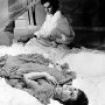Notti di Cabiria, Le
| 片名: | Notti di Cabiria, Le |
|---|---|
| 其它片名: | 花街春梦/Nights of Cabiria |
| 导演: | Federico Fellini |
| 编剧: | Federico Fellini, Tullio Pinelli, Ennio Flaiano |
| 制片人: | Dino De Laurentiis |
| 摄影: | Aldo Tonti |
| 剪辑: | Leo Cattozzo |
| 主演: | Giulietta Masina, François Périer, Franca Marzi |
| 音乐: | Nino Rota |
| 片长: | 110分钟 |
| 年份: | 1957年 |
| 类型: | |
| 国别: | 意大利/法国 |
| 语言: | 意大利语 |
| 格式: | |
| 制作机构: | Dino de Laurentiis Cinematografica |
影片概述 . . . . . .
Gorgeous early Fellini, often considered the mid-point in his career, between the more obviously reflective, supposedly realistic early work, and the bleak extravaganzas that followed. But Fellini was never a neo-realist in the dull way Rossellini was: his use of landscape was always heavily symbolic or subjective. Here Cabiria lives in the middle of a bleak wasteland, which perhaps serves to figure the emptiness of her life, the sterility of life for women in macho Italy, or a comment on post-fascist Italy itself.
It doesn't really matter. The sentiments of the film are actually quite trite - women are treated badly in Italy, etc. What's riveting and astonishing is not the experiences of Everywoman, but the experiences of one particular woman. Although there is a great variety of locales, and Cabiria seems to be always moving forward, the film is actually a melodrama. Cabiria never escapes, whatever her adventures, wherever she goes, she always ends up where she started, at home. Even when she finally sells her home for a supposed new life, her last (in the film; we just know the circle will never be broken) mirrors her first in a depressing circularity.
Yet the film, for all its melancholy, is anything but depressing. Fellini is most famous for being an indulger of frail male egos, but CABIRIA's strength lies in its imaginative sympathy with its heroine. The film's structure mirrors her situation - the film has no plot as such, just an accumulative series of self-contained episodes which follow the same pattern: escape, hope, betrayal. In each episode, the further Cabiria moves away form her 'neo-realist' base, the more dream-like (verging on the fantastic) the film becomes, as if she is stepping into an enchanted world (this is made literal when she follows the actor into the nightclub, like some mythic warrior entering the dragon's lair). And each time she gives into the dream world, the illusion is rudely shattered - the scene at the hypnotist's is as heartbreaking as anything in CHIMES AT MIDNIGHT. So while the reality/illusion dichotomy is facile as an idea, it is extraordinarily powerful as cinema experienced through character.
Fellini's filming is as beautiful as anything in 50s cinema, that decade mirabilis: more restrained and grounded than later, with less obvious flourish, but the mixture of realism and dream is made all the more convincing with the gentle, coaxing camera movements, beguiling us as well as the heroine, but with the strange editing, and sometimes disruptive composition giving us a distance she can never have.
Giuletta Masina gives the most sublime performance by an actress in Italian cinema- an exuberant mixture of hope and resignation; her gorgeous big eyes not quite ready to give up yet, even at the end, although the submitting to the youthful racket seems as hopelessly bleak as 8 1/2. Her seemingly unprepossessing body is actually an instrument of unparalelled grace, and the comparisons with Chaplin are not unwarranted - when you see this performance you'll realise how unexpressive most actors' bodies are.
The Chaplin model is not always helpful - there is a mawkishness and emotional manipulation towards the climax that almost grates, but by then you so adore Cabiria, and so hate everybody else that thought doesn't really come into it (although doesn't it seem that many male viewers seem to prefer her as helpless). Throw in a lovely, playful Nino Rota score and you're in movie heaven.卡比利亚被一个她所爱的青年推入河中。他抢走了她的钱,然后逃之夭夭。幸好她命不该绝,被人救起。
不久,卡比利亚结识了一个男演员,并被他带回家度过了一个愉快的夜晚。
可是,正当她沉浸于爱的梦幻中的时候,男演员原来的女友回来了,两人很快便和好如处。
可怜的卡比利亚躲在盥洗室里,听着两人的绵绵情话,屈辱的泪水夺眶而出。
又过了一段时间,卡比利亚在剧场结实了一个叫铎挪菲利奥的男人。这个人看来很老实,可以寄托终身。
于是,卡比利亚卖掉房子,领出全部存款,准备和他结婚。
可是,她万万没有想到,铎挪菲利奥居然也是骗子。
他把卡比利亚领到河边,抢走了她的全部积蓄,还险些把她推入悬崖。
于是,卡比利亚又和影片开头时一样,陷入无尽的黑暗中。
卡比利亚失去了一切,孑然一身,走在大路边。
这时,一群青年男女从大路上走来,他们边走、边唱、边跳。
仿佛受了他们的感染,卡比利亚渐渐恢复了生气,她的脸上又绽出微笑。
It doesn't really matter. The sentiments of the film are actually quite trite - women are treated badly in Italy, etc. What's riveting and astonishing is not the experiences of Everywoman, but the experiences of one particular woman. Although there is a great variety of locales, and Cabiria seems to be always moving forward, the film is actually a melodrama. Cabiria never escapes, whatever her adventures, wherever she goes, she always ends up where she started, at home. Even when she finally sells her home for a supposed new life, her last (in the film; we just know the circle will never be broken) mirrors her first in a depressing circularity.
Yet the film, for all its melancholy, is anything but depressing. Fellini is most famous for being an indulger of frail male egos, but CABIRIA's strength lies in its imaginative sympathy with its heroine. The film's structure mirrors her situation - the film has no plot as such, just an accumulative series of self-contained episodes which follow the same pattern: escape, hope, betrayal. In each episode, the further Cabiria moves away form her 'neo-realist' base, the more dream-like (verging on the fantastic) the film becomes, as if she is stepping into an enchanted world (this is made literal when she follows the actor into the nightclub, like some mythic warrior entering the dragon's lair). And each time she gives into the dream world, the illusion is rudely shattered - the scene at the hypnotist's is as heartbreaking as anything in CHIMES AT MIDNIGHT. So while the reality/illusion dichotomy is facile as an idea, it is extraordinarily powerful as cinema experienced through character.
Fellini's filming is as beautiful as anything in 50s cinema, that decade mirabilis: more restrained and grounded than later, with less obvious flourish, but the mixture of realism and dream is made all the more convincing with the gentle, coaxing camera movements, beguiling us as well as the heroine, but with the strange editing, and sometimes disruptive composition giving us a distance she can never have.
Giuletta Masina gives the most sublime performance by an actress in Italian cinema- an exuberant mixture of hope and resignation; her gorgeous big eyes not quite ready to give up yet, even at the end, although the submitting to the youthful racket seems as hopelessly bleak as 8 1/2. Her seemingly unprepossessing body is actually an instrument of unparalelled grace, and the comparisons with Chaplin are not unwarranted - when you see this performance you'll realise how unexpressive most actors' bodies are.
The Chaplin model is not always helpful - there is a mawkishness and emotional manipulation towards the climax that almost grates, but by then you so adore Cabiria, and so hate everybody else that thought doesn't really come into it (although doesn't it seem that many male viewers seem to prefer her as helpless). Throw in a lovely, playful Nino Rota score and you're in movie heaven.卡比利亚被一个她所爱的青年推入河中。他抢走了她的钱,然后逃之夭夭。幸好她命不该绝,被人救起。
不久,卡比利亚结识了一个男演员,并被他带回家度过了一个愉快的夜晚。
可是,正当她沉浸于爱的梦幻中的时候,男演员原来的女友回来了,两人很快便和好如处。
可怜的卡比利亚躲在盥洗室里,听着两人的绵绵情话,屈辱的泪水夺眶而出。
又过了一段时间,卡比利亚在剧场结实了一个叫铎挪菲利奥的男人。这个人看来很老实,可以寄托终身。
于是,卡比利亚卖掉房子,领出全部存款,准备和他结婚。
可是,她万万没有想到,铎挪菲利奥居然也是骗子。
他把卡比利亚领到河边,抢走了她的全部积蓄,还险些把她推入悬崖。
于是,卡比利亚又和影片开头时一样,陷入无尽的黑暗中。
卡比利亚失去了一切,孑然一身,走在大路边。
这时,一群青年男女从大路上走来,他们边走、边唱、边跳。
仿佛受了他们的感染,卡比利亚渐渐恢复了生气,她的脸上又绽出微笑。
导演阐述 . . . . . .
获得奖项 . . . . . .
评论列表(0) . . . . . . ( 发表新评论 ) ( 更多评论 )
幕后花絮 . . . . . . (上传花絮) (展开所有)
影片图集 . . . . . . (更多/我要上传)
相关视频 . . . . . . (更多/我要分享)
- Notti di Cabiria, Le 2009-3-19 16:58,4444分享
对本影片资料作出贡献的会员 . . . . . .
4444(创建者)
































